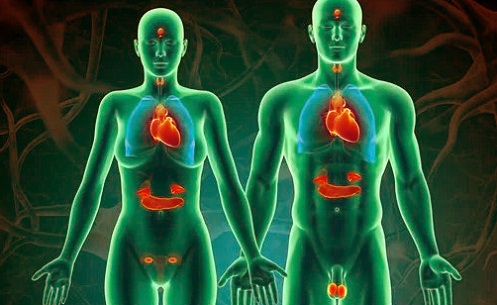Nikhil Prasad Fact checked by:Thailand Medical News Team Dec 01, 2024 1 year, 1 month, 1 week, 6 days, 6 hours, 41 minutes ago
Medical News: The Silent Impact of COVID-19 on Hormonal Health
The lingering effects of COVID-19, commonly referred to as post-COVID-19 condition (PCC) or long COVID, continue to reveal themselves as a significant public health challenge. While much focus has been placed on respiratory and neurological symptoms, a recent study by researchers from the Second Clinical Medical College of Ningxia Medical University in Yinchuan, China, highlights an important yet underexplored area - endocrine disturbances. This
Medical News report delves into their findings, offering an in-depth look at how the virus impacts the hypothalamic-pituitary-adrenal (HPA) axis and broader hormonal systems.
 Persistent Endocrine Health Challenges After COVID-19
Persistent Endocrine Health Challenges After COVID-19
PCC encompasses a broad spectrum of symptoms, including fatigue, brain fog, and muscle weakness, typically persisting for months after the initial infection. This study sheds light on five cases where the hormonal balance of patients was severely disrupted due to long COVID. Such endocrine issues, if left unaddressed, could lead to debilitating long-term effects, making early diagnosis and intervention critical.
Insights From the Study
Between June and July 2023, five patients who had recovered from COVID-19 but were experiencing prolonged symptoms were admitted to the Second Affiliated Hospital of Ningxia Medical University. The research team employed dynamic endocrine tests, including the insulin tolerance test (ITT), arginine stimulation test, and rapid ACTH stimulation test, alongside imaging studies like MRI and CT scans. These evaluations aimed to assess the state of the HPA axis and identify the root causes of the endocrine dysfunctions observed.
Key Findings on Endocrine Disturbances
The study identified several critical patterns of endocrine disruption among the participants:
-Hypothalamic Damage: All patients showed evidence of hypothalamic dysfunction, a pivotal brain region that regulates hormone secretion. This dysfunction led to secondary adrenal insufficiency, growth hormone (GH) deficiencies, and, in some cases, hyperaldosteronism.
-Reduced Hormonal Responses: The ITT revealed blunted cortisol and GH responses under hypoglycemic stress. Normally, hypoglycemia triggers a surge in these hormones, but the participants displayed inadequate secretion levels.
Imaging Abnormalities: MRI scans indicated pituitary enlargement in some cases, while adrenal gland CT scans revealed nodules, likely a response to prolonged hormonal imbalances.
-Hyperaldosteronism: Elevated levels of aldosterone - a hormone critical for salt and water balance - were noted in all patients. This condition was linked to glucocorticoid deficiency and secondary issues in the renin-angiotensin-aldosterone system (RAAS).
-Other Hormonal Shifts: Alongside GH and cortisol deficiencies, the study also recorded abnormalities in prolactin levels, thyroid func
tion, and aldosterone-to-renin ratios, suggesting a widespread impact on endocrine regulation.
Treatment Strategies and Results
To manage the endocrine disturbances, the patients were treated with a combination of hormonal therapies tailored to their specific conditions:
-ACTH Injections: Administered weekly to stimulate cortisol production and support adrenal function.
-Recombinant Human Growth Hormone (rhGH): Given nightly to address GH deficiencies and aid in recovery.
-Synthetic Glucocorticoids: Medications like prednisone and methylprednisolone were prescribed to replace deficient cortisol levels.
-Aldosterone Antagonists: Oral finerenone was used to counteract the effects of elevated aldosterone levels.
Remarkable improvements were observed within a week of treatment. Symptoms such as fatigue, brain fog, muscle weakness, and skin rashes subsided significantly. Follow-up evaluations revealed better hormonal balance, improved pituitary and adrenal function, and a return to near-normal levels of cortisol, GH, and aldosterone.
The Bigger Picture - The Role of the HPA Axis
The hypothalamic-pituitary-adrenal axis is a central player in the body’s stress response, regulating hormones like cortisol, ACTH, and aldosterone. Damage to this system can disrupt the body’s ability to manage stress, regulate metabolism, and maintain water and salt balance. In this study, the damage was likely caused by the lingering effects of the SARS-CoV-2 virus, which is known to invade cells expressing ACE2 receptors, including those in the hypothalamus and pituitary gland.
Understanding Hyperaldosteronism
One notable finding was the presence of secondary hyperaldosteronism in all patients. This condition, characterized by excessive aldosterone secretion, can lead to fluid retention, high blood pressure, and metabolic alkalosis. However, in this study, the interplay between hyperaldosteronism and glucocorticoid deficiency created a more complex clinical picture. The dual dysfunctions contributed to symptoms like edema, muscle cramps, and fatigue, which were effectively managed through targeted treatments.
Broader Implications for Long COVID
The study’s findings emphasize the need for a holistic approach to PCC. Symptoms like unexplained fatigue or persistent edema should prompt healthcare providers to investigate potential endocrine dysfunctions. Dynamic hormonal testing, as demonstrated in this research, offers a valuable diagnostic tool for identifying these issues early and guiding treatment.
Future Directions and Study Limitations
While the study provides groundbreaking insights, its small sample size limits the generalizability of the findings. Larger studies are needed to determine how common these endocrine disturbances are among PCC sufferers and to explore potential genetic or environmental factors that might influence susceptibility. Additionally, long-term follow-up studies could help assess whether these hormonal issues resolve fully with treatment or require ongoing management.
Conclusions
Patients recovering from SARS-CoV-2 infections may face significant challenges due to damage to the hypothalamic-pituitary-adrenal axis and related hormonal systems. This study demonstrates that such damage can result in complex endocrine dysfunctions, including adrenal insufficiency, growth hormone deficiencies, and hyperaldosteronism. However, the timely use of dynamic hormonal tests and tailored treatments can yield remarkable improvements.
Healthcare providers should remain vigilant for endocrine symptoms in PCC patients and consider comprehensive diagnostic protocols that include ITT, ACTH stimulation, and imaging studies. Early intervention with hormone replacement therapies, aldosterone antagonists, and supportive care can significantly enhance the quality of life for affected individuals.
The study findings were published in the peer-reviewed Journal of Endocrinology Metabolism and Diabetes of South Africa.
https://www.tandfonline.com/doi/full/10.1080/16089677.2024.2411924’
For the latest COVID-19 News, keep on logging to Thailand
Medical News.
Read Also:
https://www.thailandmedical.news/news/canadian-study-finds-that-covid-19-causes-unique-endocrine-disruptions
https://www.thailandmedical.news/news/covid-19-news-doctors-from-west-virginia-warn-that-sars-cov-2-infections-can-lead-to-thyroid-storms
https://www.thailandmedical.news/news/covid-19-causes-endocrine-issues-such-as-suppressed-function-of-the-thyroid-gland,-suppressed-male-sex-hormone-secretion-and-elevated-prolactin
https://www.thailandmedical.news/news/breaking-news-italian-study-reveals-that-sars-cov-2-is-able-to-affect-the-pituitary-gland-leading-to-possible-hypopituitarism-and-a-variety-of-disorde
(Please refer to TMN site as there are more than 37 more articles on how COVID-19 affects the various components of the endocrine system.)
